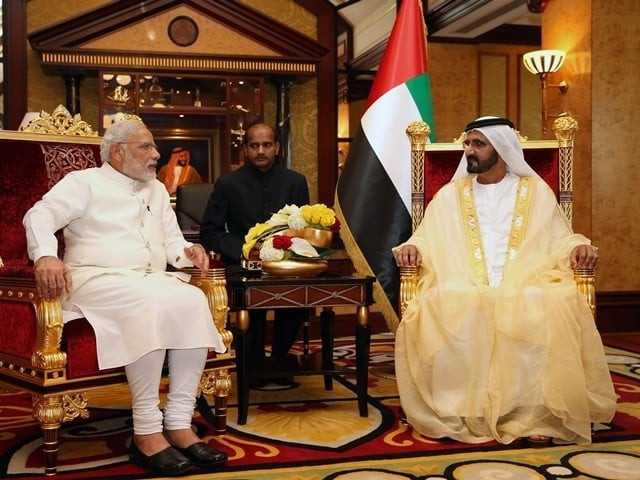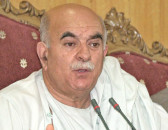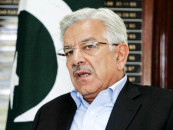Diplomatic putsch: Pakistan unperturbed as Modi woos UAE
Indian media claims joint statement acknowledges Indian claims on terrorism.

Sheikh Mohammed bin Rashid al-Maktoum, Prime Minister of the (UAE) and ruler of Dubai meeting with Indian Prime Minister Narendra Modi before a meeting in Dubai. Modi is on a two-day visit, the first by an Indian premier in more than three decades, during which he discussed "cooperation" with oil-rich UAE. PHOTO: AFP/HO/WAM
Pakistan has played down the outcome of a recent visit by Indian Prime Minister Narendra Modi to the United Arab Emirates (UAE) during which the two countries agreed to establish a strategic partnership.
In what appears to be a major policy push towards the Gulf state, Modi became the first Indian Prime Minister in 34 years to visit the UAE, traditionally considered a strong ally of Pakistan.
The move, which is being closely watched in Islamabad, comes at the heel of a definitive chill in relations between the UAE and Pakistan over the latter’s hesitation to join the fight against Houthi rebels in Yemen.
Following talks between the Indian Prime Minister and UAE Crown Prince Sheikh Mohammed bin Zayed Al Nahyan, the two countries vowed to jointly fight extremism and terrorism.
“The two nations reject extremism and any link between religion and terrorism. They condemn efforts, including by states, to use religion to justify, support and sponsor terrorism against other countries. They also deplore efforts by countries to give religious and sectarian colour to political issues and disputes, including in West and South Asia, and use terrorism to pursue their aims,’ reads the joint statement.

It said the two countries “denounce and oppose terrorism in all forms and manifestations, wherever committed and by whomever, calling on all states to reject and abandon the use of terrorism against other countries, dismantle terrorism infrastructures where they exist, and bring perpetrators of terrorism to justice.”
There was no official reaction from Islamabad to Modi’s visit but officials privately told The Express Tribune that the Indian media has given a “twisted and distorted” view of the joint statement.
“Linking the joint statement with Pakistan is just blowing the issue out of proportion,” said a senior foreign office official, who asked to remain anonymous saying Pakistan did not officially comment on bilateral visits.
He said that reference to fighting terrorism in South Asia applied more to India than any other country in the region given its current policy of using terrorism as instrument of policy. “Some of the recent statements of Indian officials clearly show which country is using terrorism as a policy,” the official said.
In April this year, Pakistan engaged in an unexpected diplomatic spat with the UAE after its deputy foreign ministry condemned Islamabad’s decision to stay neutral on the Yemen crises.
UAE minister of state for foreign affairs Anwar Gargash warned that Pakistan will have to pay a heavy price over its “vague and ambiguous stance” on the Yemen conflict.
Asked whether the UAE was reaching out to India in an effort to punish Pakistan for not siding with Arab countries on the Yemen conflict, the official insisted that Pakistan had longstanding ties with the Gulf state.
He pointed out that there were currently 1.3 million Pakistanis working in the UAE. Bilateral trade between the two countries at present stood around $9 billion.
The official also recalled that first five Air Chiefs of UAE Air Force were from Pakistan, adding that relations between “our two brotherly countries are multifaceted and strong.”
Published in The Express Tribune, August 19th, 2015.



















COMMENTS
Comments are moderated and generally will be posted if they are on-topic and not abusive.
For more information, please see our Comments FAQ